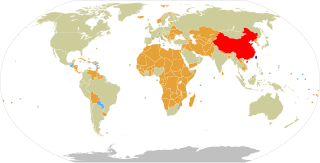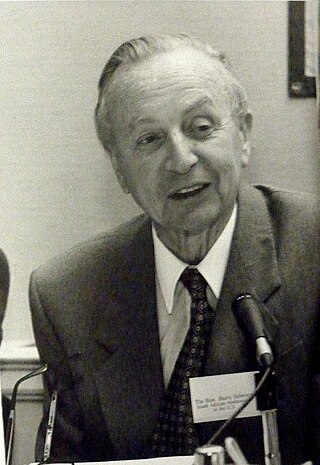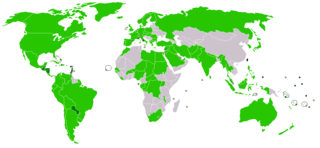The foreign relations of South Africa have spanned from the country's time as a Dominion of the British Empire to its isolationist policies under apartheid to its position as a responsible international actor taking a key role in Africa, particularly Southern Africa. South Africa is a member of the United Nations, the African Union and the Commonwealth of Nations. Considered a possible permanent addition to the United Nations Security Council, South Africa was elected in 2006, 2010 and 2018 by the UN General Assembly to serve on the Security Council. South African President Cyril Ramaphosa was the chair of the African Union from 2020 to 2021, the second time South Africa has chaired the organisation since its formation in 2003.

The Republic of China (ROC), often known informally as Taiwan, currently has formal diplomatic relations with 12 of the 193 United Nations member states and with the Holy See, which governs Vatican City, as of 29 October 2023. In addition to these relations, the ROC also maintains unofficial relations with 59 UN member states, one self-declared state (Somaliland), three territories, and the European Union via its representative offices and consulates under the One China principle. The Government of the Republic of China has the 31st largest diplomatic network in the world with 110 offices.
The term One China may refer, in alphabetical order, to one of the following:

Joost van der Westhuizen was a South African professional rugby union player who made 89 appearances in test matches for the national team, scoring 38 tries. He mostly played as a scrum-half and participated in three Rugby World Cups, most notably in the 1995 tournament, which was won by South Africa. He is widely regarded as one of the greatest scrumhalves of all time.
Wits University Football Club, also known as Wits FC, is the football club representing the University of the Witwatersrand based in Johannesburg, South Africa.

Harry Heinz Schwarz was a South African lawyer, statesman and long-time political opposition leader against apartheid in South Africa, who eventually served as the South African Ambassador to the United States during the country's transition to majority rule.

The Rand Rebellion was an armed uprising of white miners in the Witwatersrand region of South Africa, in March 1922. Jimmy Green, a prominent politician in the Labour Party, was one of the leaders of the strike.

Numerous states have ceased their diplomatic recognition of the Republic of China during the last 70 years, since the founding of the People's Republic of China. Under the One China policy, the ROC is recognized by 12 UN member states and Holy See with 59 UN member states and Somaliland maintaining unofficial cultural and economic relations.
The University of Pretoria Faculty of Law was established in 1908. It consists of six academic departments, six centres, two law clinics, and the Pretoria University Law Press (PULP). This faculty ranked best in Africa for the fourth year in a row with leading Departments of Jurisprudence; Mercantile Law; Private Law; Procedural Law; Public Law; and Centre for Human Rights. The faculty offers the undergraduate LLB degree, and postgraduate LLM/MPhil and LLD/PhD degrees.
Johann van der Westhuizen (born 26 May 1952 in Windhoek, South West Africa is a former judge of the Constitutional Court of South Africa. Before his judicial appointment, he was a professor at the University of Pretoria Faculty of Law and the founding director of its Centre for Human Rights.

The University of Pretoria is a multi-campus public research university in Pretoria, the administrative and de facto capital of South Africa. The university was established in 1908 as the Pretoria campus of the Johannesburg-based Transvaal University College and is the fourth South African institution in continuous operation to be awarded university status. The university has grown from the original 32 students in a single late Victorian house to approximately 53,000 in 2019. The university was built on seven suburban campuses on 1,190 hectares.

South Africa–Taiwan relations, also before 1998: Republic of China–South Africa relations refers to the current and historical relationship between the Republic of China (Taiwan) and the Republic of South Africa. The Republic of China and South Africa established diplomatic ties in 1949.
van der Westhuizen is a common Afrikaans surname of Dutch/Flemish origin. The largest number of van der Westhuizens can be found in Africa, but because of immigration large numbers of van der Westhuizens can also be found in Argentina, Australia, United Kingdom, Canada, New Zealand and the United States. Van der Westhuizens have had a notable presence in South African history, most notably the Great Trek, First Boer War and the Second Boer War, as well as strategic campaigns in both World Wars.
Leona Valerie Theron is a judge on the Constitutional Court of South Africa and formerly of the Supreme Court of Appeal. She was first appointed to the bench in 1999, aged 33, becoming the first black woman judge on the KwaZulu-Natal High Court. She was appointed to the Constitutional Court on 1 July 2017 by President Jacob Zuma to replace recently retired Johann van der Westhuizen. Theron is married to Charles Sarjoo and has four children.
The following lists events that happened during 2017 in South Africa.
Freemasonry was brought to South Africa by members of the Grand Orient of the Netherlands in 1772. Today there are lodges chartered under the United Grand Lodge of England, the Grand Lodge of Scotland, the Grand Lodge of Ireland, the Grand Lodge of South Africa, as well as Le Droit Humain






